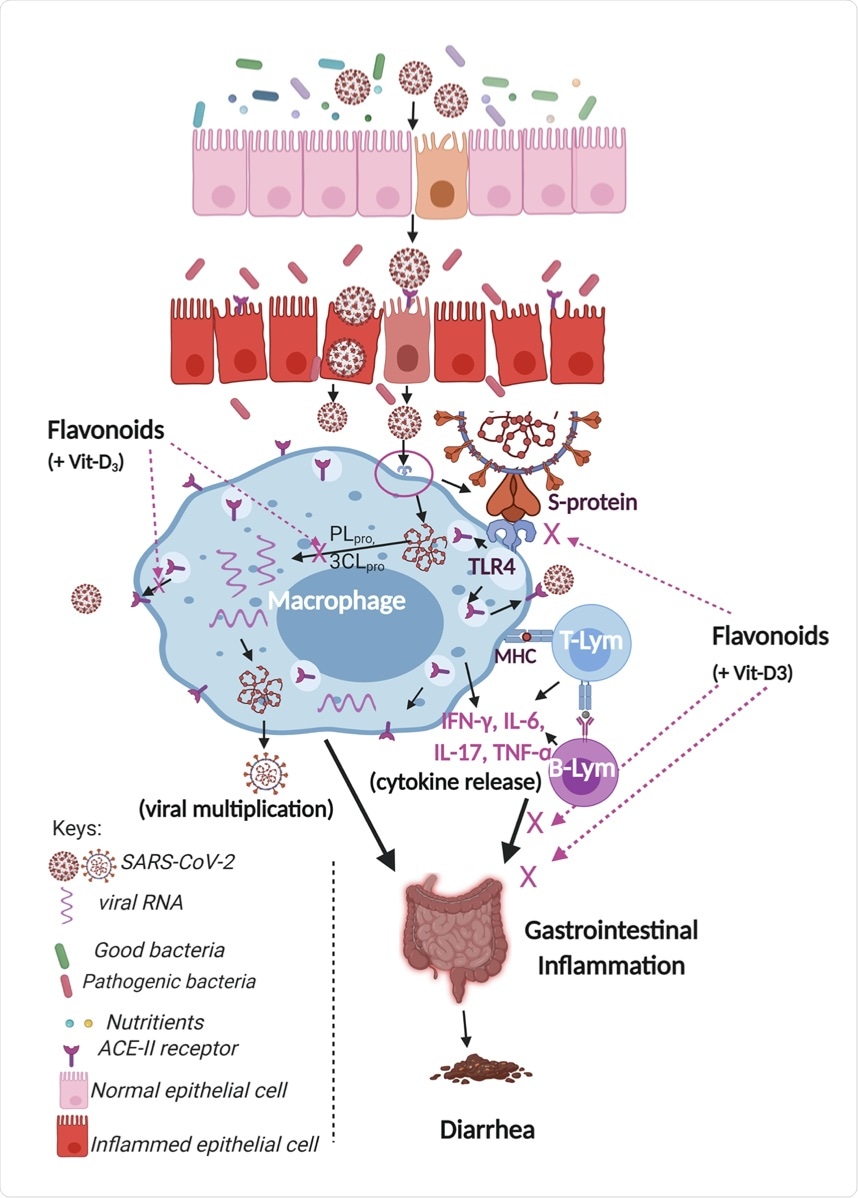The severe acute respiratory syndrome coronavirus 2 (SARS-CoV-2), which is the virus responsible for the coronavirus disease 2019 (COVID-19), has infected over 226 million worldwide and caused the deaths of almost 4.65 million.
Previous studies have also shown that flavonoids, which are a type of phytochemical, can prevent infectious diarrhea. To this end, a recent study published in Tropical Biomedicine determines whether flavonoids can help prevent diarrhea caused by SARS-CoV-2 infection.
In their study, the researchers revealed that flavonoids can help prevent diarrhea in COVID-19 patients when combined with vitamin D. Taken together, this combination treatment can activate nuclear factor erythroid-derived-2-related factor 2 (Nrf2 transcription factor), which downregulates the expression of the angiotensin-converting enzyme 2 (ACE2) receptor in cells.
Diarrhea in COVID-19
Though COVID-19 is primarily a respiratory illness, a wide range of other symptoms may appear in affected individuals. Diarrhea, for example, appears to be a common clinical symptom in some infected patients.
In fact, diarrhea has also been reported in cases of severe acute respiratory syndrome (SARS) in 2003 and the Middle East respiratory syndrome (MERS), both of which are structurally similar to SARS-CoV-2. Current estimates indicate that 10.6% of patients will experience diarrhea during acute SARS-CoV-2 infection.
Upon entry into the host, SARS-CoV-2 triggers the immune system in an effort to prevent viral replication in the body. Initially, SARS-CoV-2 infects the human lungs after binding with the ACE2 receptor, which subsequently causes the body to increase the levels of angiotensin II in the blood. As a result, the body releases chemokines, as well as activates cytotoxic (CD8+) and helper (CD4+) T-cell lymphocytes, macrophages, and natural killer (NK) cells.
Cytotoxic T-cells produce interleukin-2 (IL-2) and interferon-gamma (IFNγ), whereas the helper T-cells release pro-inflammatory cytokines like the IL-4, IL-17, IL-21, and IFNγ. Taken together, these substances cause a massive release of mucus that may lead to severe acute respiratory distress syndrome.
When there are increased levels of cytokines in the blood, the gut may also be affected. This inflammation may cause significant damage in the layers of the intestinal mucosa. Further, the imbalance in the gut microbiota and damage to the mucosal cellular barriers facilitate SARS-CoV-2 multiplication and translocation into other tissues in the body. This imbalance, termed dysbiosis, causes diarrhea, mucus secretions, stomach pain, or blood in the stool.
 Role of flavonoids against SARS-CoV-2 induced diarrhea.
Role of flavonoids against SARS-CoV-2 induced diarrhea.
Flavonoids to prevent diarrhea
Flavonoids are commonly found in plants and vegetables. Some of the most common flavonoids include quercetin, baicalin, hesperetin, luteolin, gallocatechin, and epigallocatechin, all of which are secondary metabolites of plants. Taken together, these substances are considered antioxidant, anti-inflammatory, and antimicrobial agents.
Flavonoids can also help boost the immune system to ward off infections, as they have been found to inhibit some enzymes that are important for the SARS-CoV-2 replication.
In the current study, the team revealed that flavonoids, particularly epigallocatechin-3-gallate found in green tea, along with vitamin D3, can activate the Nrf2 transcription factor. The activation of Nrf2 transcription factor subsequently downregulates ACE2 expression from the cellular surfaces.
In terms of COVID-19-induced diarrhea, flavonoids also have the potential to alleviate COVID-19 and/or ease diarrhea. Quercetin, the most popular flavonoid, has been shown to prevent the interaction of the SARS-CoV-2 spike protein and ACE2 receptor and suppress the inflammatory markers.
Today, the exact role of flavonoids against COVID-19-induced diarrhea is still preliminary. As a result, there remains a need for preclinical and clinical studies to further explore the full potential of these compounds against COVID-19-induced diarrhea.